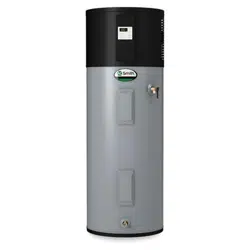Loading ...
Loading ...
Loading ...

MAINTENANCE
Residen al Hybrid Electric Heat Pump Water Heater Use and Care Guide • 29
Anode Rod. The anode rod is a sac-
rifi cial metal rod that helps reduce
corrosion and premature failure (leaks)
in the tank. The anode rod is a consum-
able item. Inspect the anode rod a er
the fi rst six months of opera on when
you drain and fl ush the tank. Replace
the anode rod if it is substan ally worn
out or depleted. Therea er, inspect the
anode rod annually or more frequently
if needed. If you use a water so ener,
your anode rod will deplete faster than
normal. Inspect the anode rod more
frequently, replacing the anode rod as
needed. Obtain new anode rods from
your local plumbing supplier or have
a qualifi ed person replace it. (Anode
rods are a consumable item and are not
covered under warranty).
8
If the sediment was present
when the tank was drained,
fl ush the tank by opening the
cold water supply valve and le ng the
water run un l no more sediment
drains from the tank. Close the drain
valve when you are done.
NOTICE: Do not turn power back on
un l the tank is completely full of wa-
ter. For complete instruc ons on fi lling
the tank, follow Step 10 in the Installa-
on sec on.
9
Refi ll the tank by opening the
cold water supply valve. Make
sure a hot water faucet is
open and the drain valve is closed.
Allow the hot water to run full for at
least three minutes to make sure the
tank has all the air removed and is
completely full of water. Failure to
perform this step can cause the upper
hea ng element to burn out. Once you
are certain the tank is completely full
of water, close the hot water faucet.
10
Restore power to the water
heater. It may take two hours
for the tank to heat up.
Replacing the Hea ng
Element
WARNING! Working on an ener-
gized circuit can result in severe injury
or death from electrical shock. Turn
power off . Check wires with a non-
contact circuit tester to make sure
power is off . When you are fi nished,
be sure all covers are secured to re-
duce the risk of fi re and electric shock.
If you are not comfortable replacing a
hea ng element or thermostat your-
self, have this work done by a qualifi ed
person. To replace the hea ng ele-
ment, you’ll need the following tools
and supplies:
Figure 35 - Non-Contact Circuit Tester
• Always turn power OFF and check
the power wires with a non-contact
circuit tester before working on the
water heater.
Figure 36 - Heating Element (with
gasket)
• Check your water heater’s data
plate for the correct wattage and
voltage. Heating elements are
available your local plumber sup-
plier.
Figure 37 - Element Wrench
• Some regular sockets (1 1/2 inch)
may work, but regular sockets are
often beveled and may slip. Inex-
pensive element wrenches are
available at your local plumber sup-
plier.
• Garden hose to drain the tank
• Hand dishwashing soap to lubricate
the gasket
• A clean cloth to clean the threaded
opening
• A flat blade and a Phillips screw-
driver
Steps for Replacing the Hea ng
Element:
1
Turn the power OFF at the
circuit breaker or remove fuses.
Figure 38 - Circuit Breaker
2
Open the electrical junc on
box on the side of the water
heater. Using a non-contact
circuit tester, check the power wires to
make certain the power is OFF.
Figure 39 - Non-Contact Circuit Tester
MAINTENANCE
Loading ...
Loading ...
Loading ...
